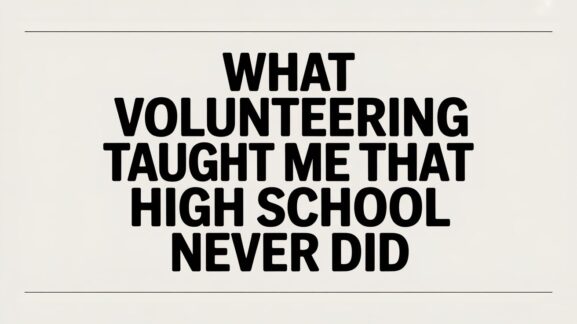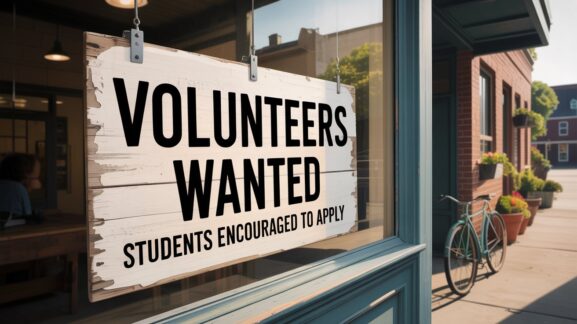The Unexpected Returns of Giving Time Away
I used to think volunteering was basically just resume padding. Like, another thing to check off the list so college admissions people would think I was a decent human being. Me and basically everyone I knew treated it the same way we treated everything else back then: what’s the minimum I can do to get maximum credit? How do I make this look good on paper while spending the least amount of time actually doing it?
But now that I’m past all that application stress and have some actual distance from high school, I’m realizing I completely missed what volunteering was really about. The benefits I actually got from it were nothing like what I expected.
The Permission to Mess Up Without Consequences
The first thing that hit me was that volunteering is basically the only place where you can totally bomb and it doesn’t really matter. When you’re tutoring some kid or helping out at a soup kitchen, there’s no grade attached to how well you do. No one’s ranking your performance or putting it in your permanent record.
This was honestly life-changing. Because when screwing up doesn’t threaten your GPA or your college prospects, you actually start trying new things. You experiment. You realize that completely failing at explaining fractions to a second-grader isn’t the end of the world; it’s just feedback. Next time, you try a different approach.
Looking back, I spent most of high school absolutely terrified of making any mistake that might hurt my chances of getting into a good school. Volunteering was literally the first place where I learned that messing up and then figuring out how to do better is actually how you get good at stuff. Every time I bombed at explaining something to a kid, I learned more about how to actually communicate than I did from any class presentation.
Being a Nobody Is Actually Pretty Great
Here’s something weird that I never expected: volunteering is one of the few places where you can be completely unimportant and still be useful. You’re not the person in charge. You’re not the expert. You’re definitely not the star of the show. You’re just some random volunteer who showed up to help out.
And honestly? That was so refreshing. When you’re not trying to be the center of attention or prove how smart you are, you actually start noticing how things really work. You watch the people who actually know what they’re doing. You see how organizations function when they’re not built around showcasing your talents. You learn that most important work gets done by people whose names you’ll never even know.
This completely changed how I think about everything. Because the real world isn’t set up to highlight how special you are. It’s set up to get stuff done, and the people who figure out how to be helpful without needing to be the hero are the ones who actually make things happen.
Learning Skills You Can’t Get in School
Volunteering also taught me things I never could have learned in a classroom. When you’re working with people who have real problems (not just academic ones), you develop this completely different type of competence. You learn how to talk to people who come from totally different backgrounds than you. You figure out how to actually help without being condescending. You practice just being present with people who are going through tough stuff.
These aren’t things you can study for or learn from a textbook. They’re skills you only develop by actually doing them over and over. And unlike the stuff you learn in school, which sometimes feels pretty disconnected from real life, these abilities pay off immediately. Every conversation makes the next one easier.
A Break from the Optimization Game
Maybe the biggest thing volunteering did for me was give me a break from the constant optimization mindset that dominated literally everything else in my life. In a world where every single activity had to be justified by how it would help me get into college, volunteering was refreshingly pointless. You couldn’t game it. You couldn’t hack it. It just was what it was.
And that “inefficiency” turned out to be exactly what I needed. When you’re not trying to maximize your return on investment, you start paying attention to different things. You notice how it feels to actually help someone. You realize that just showing up consistently matters more than being brilliant. You learn that a lot of the most important work happens quietly, in the spaces between official responsibilities.
Playing the Long Game
Looking back now, I think volunteering taught me something about time and value that I couldn’t have learned anywhere else. In a culture that’s obsessed with immediate results and measurable outcomes, volunteering forced me to think in longer time frames. The impact of helping someone learn to read or serving food to homeless people isn’t something you can track with data. It’s something that spreads out in ways you’ll never fully see.
This long-term perspective has changed how I approach pretty much everything. Instead of always asking “what’s in it for me right now?” I’ve started asking “what kind of person does this help me become?” Instead of optimizing for short-term gains, I’m trying to optimize for the kind of character that can do meaningful work for decades.
The crazy thing is that this shift in mindset has actually made me better at everything else. When you’re not constantly calculating what you’re going to get out of something, you can focus on just doing good work. And good work creates its own rewards in ways you can’t predict or plan for.
So while everyone else was building their resumes, I was accidentally building character. And honestly, that might be the most valuable thing I could have done with my time.



